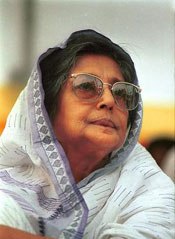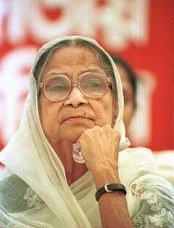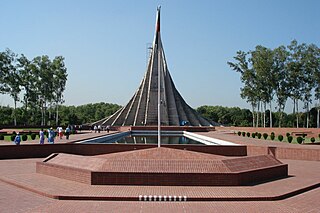
The Shaheed Minar is a national monument in Dhaka, Bangladesh, established to commemorate those killed during the Bengali Language Movement demonstrations of 1952 in then East Pakistan.

Shamsur Rahman was a Bangladeshi poet, columnist and journalist. A prolific writer, Rahman produced more than sixty books of poetry collection and is considered a key figure in Bengali literature from the latter half of the 20th century. He was regarded as the unofficial poet laureate of Bangladesh. Major themes in his poetry and writings include liberal humanism, human relations, romanticised rebellion of youth, the emergence of and consequent events in Bangladesh, and opposition to religious fundamentalism.

Jahanara Imam was a Bangladeshi writer and political activist. She is known for her efforts to bring those accused of committing war crimes in the Bangladesh Liberation War to trial. She has been called "Shaheed Janani".

Ghulam Azam was a Bangladeshi Islamist politician and a war criminal. He was the former leader of Bangladesh Jamaat-e-Islami, the oldest and the largest Islamic political party in Bangladesh.

Begum Sufia Kamal was a Bangladeshi poet, feminist leader, and political activist. She took part in the Bengali nationalist movement of the 1950s and civil society leader in independent Bangladesh. She led feminist activism and was a president of Bangladesh Mahila Parishad. She died in 1999 and was the first woman to be given a state funeral in Bangladesh.
Rabeya Khatun was a Bangladeshi novelist. She wrote over 50 novels and more than 400 short stories. Her works also include essays, research, religious history and travelogues. She was awarded Bangla Academy Literary Award in 1973, Ekushey Padak in 1993 and Independence Day Award in 2017 by the Government of Bangladesh.

A Golden Age is the first novel of the Bangladesh-born writer Tahmima Anam. It tells the story of the Bangladesh War of Liberation through the eyes of one family. The novel was awarded the prize for Best First Book in the Commonwealth Writers' Prize 2008. It was also shortlisted for the 2007 Guardian First Book Award. The first chapter of the novel appeared in the January 2007 edition of Granta magazine.
Abu Naser Muhammad Gaziul Haque was a language activist and an activist leader during the Bengali Language Movement.
Altaf Mahmud was a musician, cultural activist, and martyred freedom fighter of the Bangladesh Liberation War. He was also a language activist of the Language Movement and composer of "Amar Bhaier Rokte Rangano", the famous song written to commemorate the event.

Shahriyar Kabir(Bengali: শাহরিয়ার কবির; born 20 November 1950) is a Bangladeshi journalist, filmmaker, human rights activist, and author of more than 70 books focusing on human rights, communism, fundamentalism, history, and the Bangladesh war of independence. He was awarded Bangla Academy Literary Award in 1995.
Shafi Imam Rumi was a guerilla fighter of the Bangladesh Liberation War. He was the eldest son of Jahanara Imam. In her memoir about the war, Ekatorer Dinguli, Rumi was portrayed as the premier character. Rumi was murdered by the Pakistani Army.

There have been numerous works of art created as a result of the Bangladesh Liberation War. In 1971, a concert was organized by members of the British rock band, The Beatles, in support of Bangladesh. The songs recorded for and broadcast on Swadhin Bangla Betar Kendra are still considered to be the best of Bangladeshi protest songs.
Ajoy Roy was a Bangladeshi professor of physics at the University of Dhaka, but was best known for his prominent role in Bangladesh's human rights activism and freethinking. He was one of the eminent educationists promoting secular humanism in Bangladesh.
The Jinjira massacre was a planned killing of civilians by the Pakistan army during the Bangladesh liberation war of 1971.
The Ekattorer Ghatak Dalal Nirmul Committee is a pressure group founded to demand the trial of war criminals from the Bangladesh Liberation War. It advocates for secularism in Bangladesh.
The Crack Platoon was a special commando team of the Mukti Bahini. which was formed in 1971, during the Bangladesh Liberation War. It was formed by young members of the Mukti Bahini, which carried out commando operations in Dhaka and its surroundings and led by Major Khaled Mosharraf. The commandos were mostly students and civilians, who received guerrilla training later in the training camps for Mukti Bahini and then engaged in battle against the Pakistani Army.

The movement demanding trial of war criminals is a protest movement in Bangladesh, from 1972 to present demanding trial of the perpetrators of 1971 Bangladesh genocide during the Bangladesh Liberation War from Pakistan.
Shariful Alam Imam Ahmed was a participator in Bangladesh Liberation War. He is most widely remembered as the husband of "Shaheed Janani" Jahanara Imam and as the father of Guerrilla fighter Shafi Imam Rumi. He is a character in Jahanara Imam's famous memoir Ekattorer Dingulee.
Syed Sajjad Hussain was a Pakistani-Bangladeshi academic and writer. He served as the 4th Vice-chancellor of the University of Rajshahi.
Lieutenant Colonel Abdul Qadir was an officer of the Pakistan Army and later ADOS for Mukti Bahini while serving in Chittagong, during the initial period of Bangladesh Liberation War. He was involved in the Bengali independence movement and was arrested by the Pakistan Army in April 1971. He was presumed to have been murdered and in 2008, his body was found in a mass grave.









